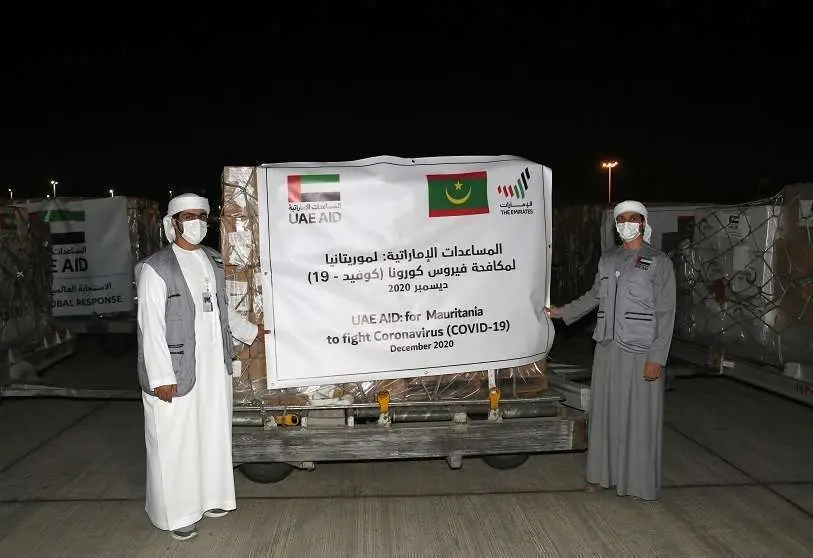Emirates sends medical aid to Mauritania again

More than 121 countries have benefited so far from the aid provided by the United Arab Emirates, estimated at 1,685 metric tonnes and 1.6 million doctors benefited. Countries around the world, from emerging to developed, have benefited from humanitarian and medical support from the Arab country. It recently even became the first Arab country to send aid to the Gaza Strip.
The Arab Emirates has been supporting the World Health Organization (WHO) in strengthening its strategic reserve to deal with the pandemic and supporting its efforts to provide a humanitarian response to countries in need.
One of the latest countries to receive medical aid was Colombia, at the end of November, the sixth such country to receive from the UAE. The donation included five million FFP2 masks, more than 51,000 infrared thermometers, more than 35,000 protective suits and more than 27,000 protective masks, among other essential supplies.
Mauritania is another country that has benefited on several occasions from Emirati aid. The African country is the destination of a final Emirate aid package containing more than 10 tonnes of medical supplies, testing equipment and fans, as well as specialised medical equipment, to reinforce the country's efforts to stop the spread of the virus. The UAE's initiative joins others such as the public-private consortium the country is leading to ensure that vaccines reach as many countries as possible.
Mauritania was one of the first countries to receive aid from the United Arab Emirates to combat COVID-19. In previous shipments, they delivered 22 tonnes of medical equipment to help health professionals on the front line.
"This reflects the distinguished relations between the leaders and people of the two countries," said the UAE Ambassador to Mauritania, Hamad Ghanem al-Mehairi.
The union of the two countries was already reflected in early 2020 when the Arab country gave $2 billion in aid to Mauritania to finance development projects.
Even then the country's citizens were suffering from high levels of poverty, with up to 20% living on $1.25 a day. The effects of the health crisis have only increased the problems the Maghreb country was experiencing.
Since the appearance of COVID-19 in Mauritania, with a population of four million, last March, the country has recorded some 12,000 infections and 264 deaths. The second wave has sounded the alarms of the authorities who have requested the support of friendly countries and external partners.
Last week authorities were forced to close schools and mosques in response to the spread of the virus. No collective prayers, including Friday prayers, the most important prayer in the Muslim religion, will be allowed, and national schools will be closed until 4 January. In addition, a nationwide curfew has again been decreed from 6pm to 6am.
France for its part confirmed yesterday that it will provide financial assistance of EUR 12.5 million. The first part is a 2.5 million euros grant to finance emergency actions against the coronavirus and a restructuring project of the Mauritanian Ministry of Health. The aid will strengthen capacities for epidemiological surveillance, diagnosis and virological examinations and patient care, and will make it possible to purchase health equipment.
It will provide an additional ECU 10 million to set up a social safety net and a cash transfer system to compensate for the lack of income of 210 000 households. Another item will be used to train young people in the manufacture of cloth masks and hand-washing devices. In addition, Paris also announced the suspension of Mauritania's debt service for a total of 5.3 million euros and its contribution to a multilateral initiative that will pay for vaccines for countries such as Mauritania, which in the case of this country will benefit 20% of the population.








